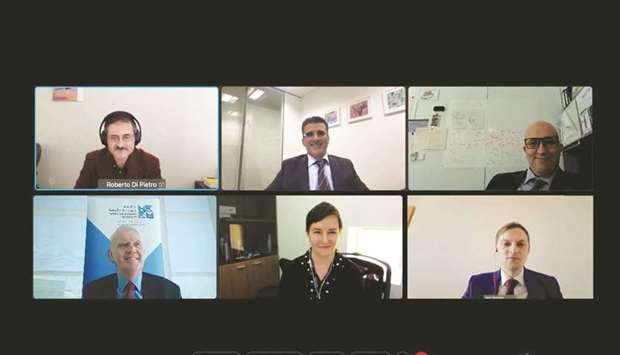The Office of the Vice President for Research (OVPR) at Hamad Bin Khalifa University (HBKU) recently hosted a virtual showcase of projects by its colleges and research institutes that highlighted high-impact, thematic research in artificial intelligence (AI), social progress, precision medicine, and sustainability.
Nine projects were awarded under the first cycle of HBKU’s Thematic Research Grant Programme and funded by the OVPR to support HBKU researchers in tackling pressing scientific challenges; align with the university’s research priority areas; and address topics of vital national importance.
Following opening remarks by Dr Richard O’Kennedy, vice president for Research, Development, and Innovation at Qatar Foundation and vice president of Research at HBKU, and Dr Rachid Zaffou, senior planning and research director, the virtual event gave Lead Project Investigators (LPIs) of four of the awarded projects the opportunity to present their research work and highlight the progress being achieved.
Dr. Hicham Hamoudi, senior scientist at Qatar Environment and Energy Research Institute (Qeeri), is developing 3D printers capable of creating new carbon-based materials and metallic structures. The project leverages the assets and expertise at Qeeri and HBKU in computer modelling, nanofabrication, electronics, and systems engineering.
Showing HBKU’s genomics research strengths, Dr Borbala Mifsud, assistant professor, College of Health and Life Sciences, discussed her project to define autism-associated neuronal enhancers in collaboration with Qatar Biomedical Research Institute.
Outcomes will benefit clinicians, researchers, and families with autistic children by helping to identify the genetic cause of autism cases, novel associated genes and genomic regions. The project could also potentially lead to biomarkers and epigenetics discoveries.
An AI and law project by Dr Roberto Di Pietro, professor in Cybersecurity at the College of Science and Engineering, is developing technological and legal countermeasures to address the spread of unauthorised internet proxy services. He is investigating the functioning of the Residential Proxy to develop an AI-based detection mechanism and collaborating with HBKU’s College of Law to define policy guidelines to stem the spread of certain proxy services.
With collaborators across HBKU, Dr. Barry Solaiman, assistant professor, College of Law, is developing a benchmark regulatory framework for using AI in health-related research in Qatar and the Middle East. A certification process focusing on AI for precision medicine will provide a mark of credibility for local research, supporting its international dissemination.
Commenting on the event, Dr. O’Kennedy said: “We are delighted to see the early results of high-impact scientific research driven by our outstanding faculty and researchers. Their commitment helps HBKU expand its reputation as a distinguished Qatari hub for innovative research that improves lives and supports the country in achieving its national vision. An equally important focus is promoting and supporting cross-collaboration and multidisciplinary research themes across our research entities and among our faculty and researchers. This helps to leverage synergies that further drive research productivity and accelerate innovation.”
Following opening remarks by Dr Richard O’Kennedy, vice president for Research, Development, and Innovation at Qatar Foundation and vice president of Research at HBKU, and Dr Rachid Zaffou, senior planning and research director, the virtual event gave Lead Project Investigators (LPIs) of four of the awarded projects the opportunity to present their research work and highlight the progress being achieved.
Dr. Hicham Hamoudi, senior scientist at Qatar Environment and Energy Research Institute (Qeeri), is developing 3D printers capable of creating new carbon-based materials and metallic structures. The project leverages the assets and expertise at Qeeri and HBKU in computer modelling, nanofabrication, electronics, and systems engineering.
Showing HBKU’s genomics research strengths, Dr Borbala Mifsud, assistant professor, College of Health and Life Sciences, discussed her project to define autism-associated neuronal enhancers in collaboration with Qatar Biomedical Research Institute.
Outcomes will benefit clinicians, researchers, and families with autistic children by helping to identify the genetic cause of autism cases, novel associated genes and genomic regions. The project could also potentially lead to biomarkers and epigenetics discoveries.
An AI and law project by Dr Roberto Di Pietro, professor in Cybersecurity at the College of Science and Engineering, is developing technological and legal countermeasures to address the spread of unauthorised internet proxy services. He is investigating the functioning of the Residential Proxy to develop an AI-based detection mechanism and collaborating with HBKU’s College of Law to define policy guidelines to stem the spread of certain proxy services.
With collaborators across HBKU, Dr. Barry Solaiman, assistant professor, College of Law, is developing a benchmark regulatory framework for using AI in health-related research in Qatar and the Middle East. A certification process focusing on AI for precision medicine will provide a mark of credibility for local research, supporting its international dissemination.
Commenting on the event, Dr. O’Kennedy said: “We are delighted to see the early results of high-impact scientific research driven by our outstanding faculty and researchers. Their commitment helps HBKU expand its reputation as a distinguished Qatari hub for innovative research that improves lives and supports the country in achieving its national vision. An equally important focus is promoting and supporting cross-collaboration and multidisciplinary research themes across our research entities and among our faculty and researchers. This helps to leverage synergies that further drive research productivity and accelerate innovation.”

